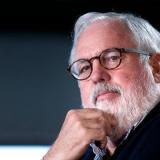Israel to Host East Med Pipe Summit
Three EU countries, an EU representative and Israel’s energy ministry will next week present a plan for what Israel describes as the world's longest undersea natural gas pipeline. It is also seen as one of the least probable such schemes.
The meeting will be hosted by the minister Yuval Steinitz and attended by Italy’s minister for economic development Carlo Calenda; Greece’s energy minister Giorgos Stathakis; and his Cypriot counterpart Yiurgos Lakkotrypis. Representing the European Commission will be Miguel Arias Canete, in charge of energy and climate action (pictured below).
The pipeline will cross the Mediterranean from Cyprus and Greece and land in Italy, over 2,000 km away from the well heads. The pipeline would have four sections up to west Greece, of which the last would be onshore:
- 200 km to Cyprus;
- 700 km from Cyprus to Crete;
- 400 km from Crete to mainland Greece (Peloponnese);
- 600 km crossing Peloponnese and west Greece.
From west Greece, one branch would stretch to northern Greece and Bulgaria, and another one would cross undersea the Adriatic to Italy.

(Credit: EC)
In a report sponsored by the EU, Greek's IGI-Poseidon calculate that the costs of the 2,000 km pipeline would be $5.7bn. IGI Poseidon is owned in equal shareholdings by Edison of Italy and Depa Group, Greece's national supplier.
A few decades in the making
According to the CEO of Ecoenergy Amit Mor, this plan has been decades in the making and it is not the only proposal on the table.
For example Rosneft, Russia's biggest oil company, might consider laying a pipeline from the Zohr gas field offshore Egypt, to Europe. In December last year, Rosneft bought 30% shareholding in Zohr from Eni for $1.125bn and increased Russia's involvement and influence over the nascent gas industry in the eastern Mediterranean.
Of the two proposals, the Israeli one might have the edge in Brussels as it would cut European gas supply dependency on Russia. The project already enjoys the status of Project of Common Interest by the EU.
In 2015 the project had European grants of €2mn through the Connecting Europe Facility (CEF) program necessary for the co-finance of the pre-front-end engineering and design.
Ya'acov Zalel



